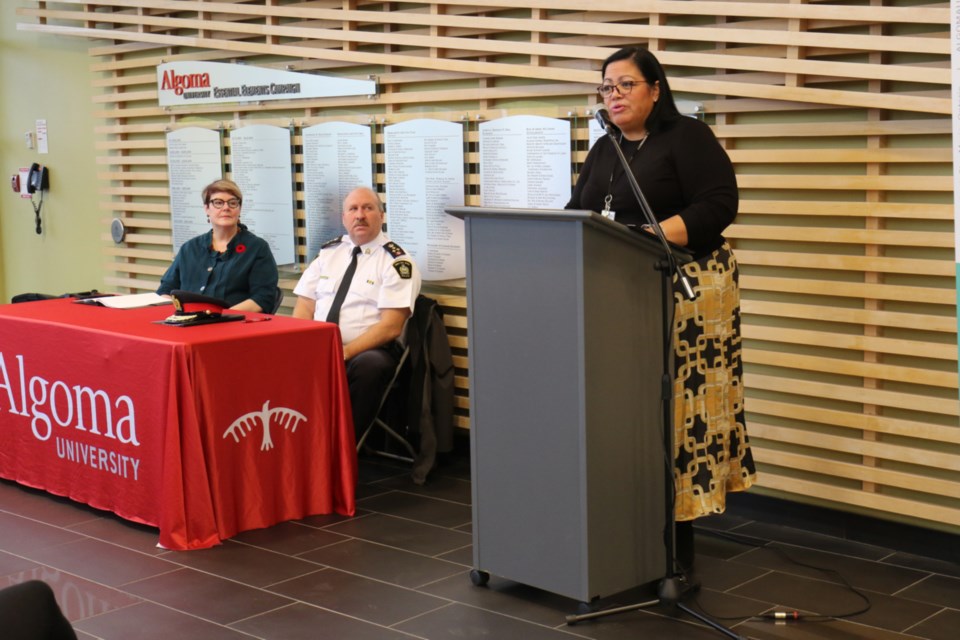Algoma University and Sault Ste. Marie Police Service (SSMPS) have expanded its partnership to include training for police staff on the university campus.
City police now has an administrative office and boardroom located in the Convergence Centre building and will be able to carry out use-of-force training at the university’s gymnasium facilities.
The current agreement will be in effect until August 31, 2020.
“I want students to understand that policing is a partnership with the community, and this opportunity puts us in a place where we can interact much more with them,” said Sault Ste. Marie Police Services Chief Hugh Stevenson.
“We’re happy to see them here,” said Algoma University provost and academic dean Dr. Donna Rogers. “They’re using our facilities, our community is aware of what they’re doing and their purpose to be here, and we think it’s a really positive outcome for the collaboration.”
Rogers says the expanded partnership between the police service and the university that began last year with the signing of a memorandum of understanding to establish Shifting Indigenous Frontline Tactics (SHIFT) for city police staff.
Four cohorts of SSMPS officers and staff have completed SHIFT training since last year.
“It began as us delivering training for them, but really what we’ve seen it evolve into is a partnership where we collaborate in a way where they give, we give, and we work together,” Rogers said.
For SHIFT facilitator Elizabeth Edgar-Webkamigad - who also serves as director for the Shingwauk Residential Schools Centre - the training provided through SHIFT helps inform officers when dealing with Indigenous people, families and situations.
She says that participants learn about initial contact between Indigenous and non-Indigenous people, and the legislation that arose from it through the Indian Act - such as learning about the reserve day pass system which permitted Indigenous people to leave reserves to hunt or work - before branching into more contemporary issues.
“Then we start moving into more recent - residential school, the sixties scoop, child welfare issues - right on into current day,” said Edgar-Webkamigad. “Missing and murdered Indigenous women and girls, and a number of different things in between that really help the people who go through SHIFT training to gain an understanding of some of the history, and why we’re seeing some of the things we see in today’s present world or today’s present family.”
“Some of the multi-generational residue that has come down that causes things like addictions, things like some of the domestic violence situations, some of the reasons why child welfare is still involved with a lot of our First Nation, Metis and Inuit families, and how do we help people understand, so that they can come from a place that allows them to have a bit of compassion, empathy.”
Stevenson says that participating in SHIFT has been a journey for him personally.
“We can never assume that we know, we can never assume that we understand everything,” “You know, I had 31 years of policing in the OPP, very progressive service filled with partnerships. I was actually part of Indigenous training and First Nation negotiator for part of my career,” he told reporters following Tuesday’s announcement. “But when I came here, I learned things that I had no idea actually existed, and you can’t help but feel the passion, see the harm that ignorance has done to all of us in our personal lives and our professional lives.”
“And when you hear what Indigenous people went through in terms of colonization, it does have an impact on you.”
Stevenson says that in addition to the SHIFT programming, SSMPS staff are using the Algoma University campus to complete training surrounding case law updates, changes to policing industry and public safety.
“It’s to demonstrate to the community, the university and the policing community the value of a partnership with an Indigenous learning university,” he said. “The opportunity for our officers and command staff to interact with administrative staff as well as students is crucial for everyone to understand the value of partnerships and what it does for public safety.”
